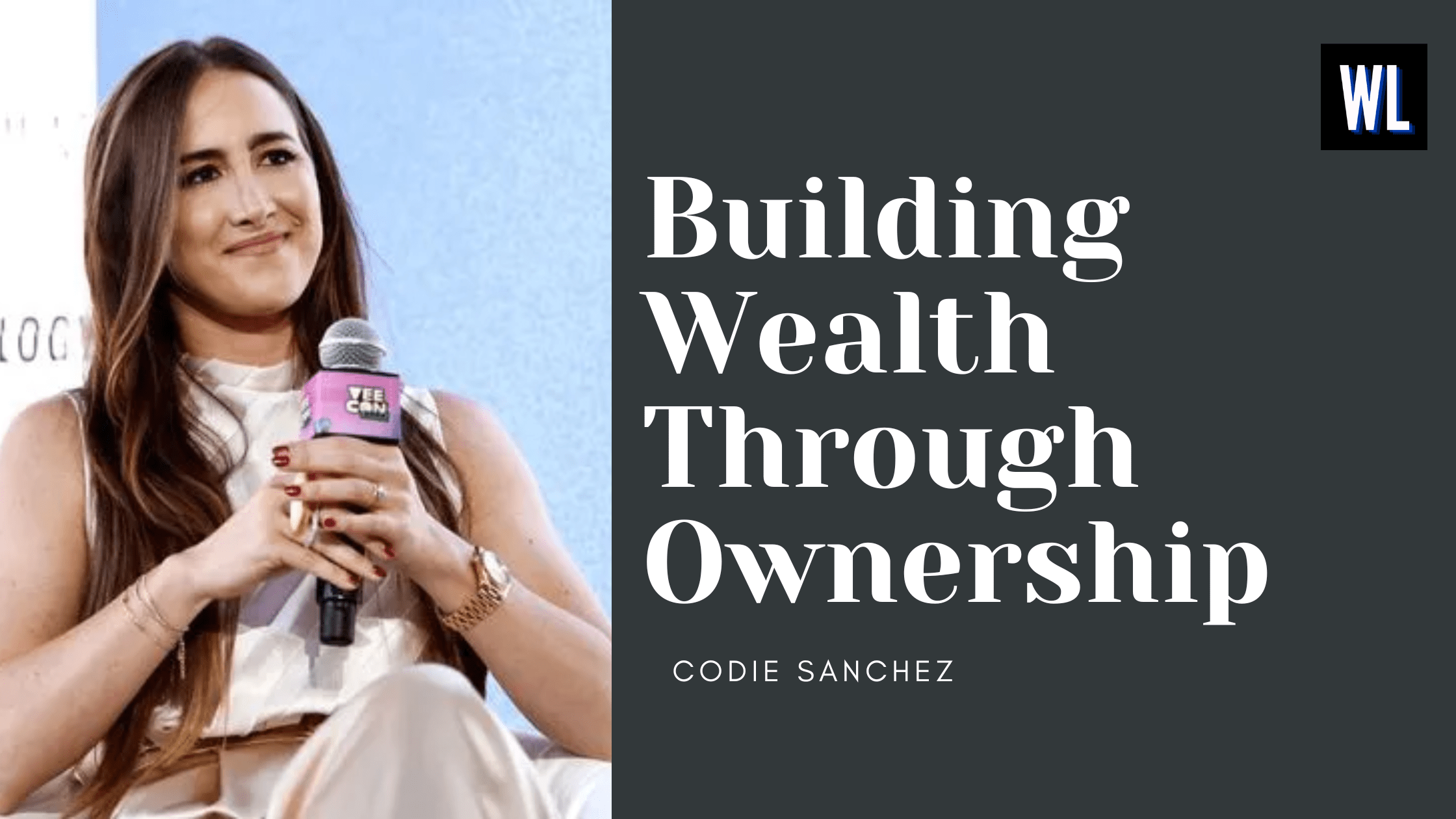Have you ever wondered what sets wealthy people apart from the rest? It’s not just luck, inheritance, or a high-paying job. According to Codie Sanchez, a leading entrepreneur and advocate for financial independence, the secret lies in ownership.
Ownership—of businesses, assets, or equity—creates the foundation for long-term wealth. In fact, studies reveal that 70% of millionaires are self-made, and nearly 68% have built or invested in businesses. These figures prove one thing: building wealth isn’t reserved for a privileged few—it’s within reach if you know where to start.
In this blog, we’ll explore why ownership is key to financial freedom, how to adopt an “ownership mindset,” and practical ways to identify and acquire wealth-building opportunities.
The Wealth Equation: Why Ownership is Key
The Power of Ownership
Think about the most common advice given about money: save diligently, invest in the stock market, or work harder to climb the career ladder. While these are solid strategies, they rarely lead to significant wealth. Why? Because they lack the one element that sets millionaires apart—ownership.
Ownership creates compounding value. Instead of earning only a salary, ownership ensures you benefit from profits, growth, and, eventually, a potential sale. Codie Sanchez explains it simply: “If you don’t have ownership, you’ll likely never achieve financial freedom.”
The maths is clear. A business generating steady cash flow doesn’t just pay for itself—it appreciates over time. For instance, a small roofing company or a thriving café could provide you with income today and be sold for a sizeable profit tomorrow. Ownership gives you control over your time, income, and future in a way that employment alone cannot.
Why Employment Has Limits?
Jobs provide stability, but they come with a ceiling. Your income is tied directly to the hours you work or the role you hold. Compare this to owning a business where profits grow beyond your effort. The disparity becomes clear:
- As an employee: You rely on pay raises and promotions, both of which are controlled by someone else.
- As an owner: Your income depends on the performance of your asset. A successful business can double or triple in value while generating consistent earnings.
Even small ownership stakes can yield impressive returns. Many millionaires began by acquiring modest businesses, learning as they went, and reinvesting profits into new ventures. Ownership transforms effort into equity—a crucial step toward financial independence.
Breaking Down the Ownership Mindset
Redefining Your Relationship with Money
Most people struggle with money not because of a lack of opportunity but because of deeply ingrained beliefs. If you’ve ever thought, “I’m bad at maths” or “Money isn’t everything,” you’re not alone. However, these narratives often hold us back from making informed financial decisions.
Codie Sanchez argues that changing how we think about money is critical to building wealth. She believes financial literacy—the ability to understand and manage money—isn’t a skill we’re born with; it’s one we can all develop.
For example, learning how businesses generate revenue, cut costs, and scale doesn’t require advanced maths. It’s about understanding cash flow, expenses, and profits in straightforward terms. By reframing money as a tool rather than an obstacle, you can start to see opportunities instead of barriers.
How to Develop an Ownership Mindset
Developing an ownership mindset begins with a shift in focus—from working for money to making money work for you. This isn’t about abandoning your job or taking on risky ventures. Instead, it’s about exploring where you can gain “skin in the game.”
For example, rather than seeing money as scarce or elusive, think of it as abundant and within reach if you take the right steps. One way to begin is by learning the basics of finance, such as how to evaluate a business or spot investment opportunities.
Equally important is recognising your unique strengths. Codie advises that you don’t need to be an entrepreneur with the next big idea to succeed. Instead, you can invest your skills—whether in marketing, operations, or finance—to gain a stake in an existing business. Ownership doesn’t mean starting from scratch; it means leveraging what you already have.
Overcoming the Fear of Money
For many, the fear of managing money stems from a lack of confidence. According to a recent survey, 62% of Americans avoid talking about money altogether, viewing it as taboo or stressful. Overcoming this fear starts with small steps:
- Start having conversations about money with trusted friends or mentors.
- Read or listen to accessible financial resources to demystify complex topics.
- Take a hands-on approach—explore budgeting tools, calculate net worth, or even shadow a business owner to understand how money flows.
The goal is to normalise money as a topic of discussion and a tool for building your future.
Identifying Wealth-Building Opportunities
Starting with Small Wins
Owning a business doesn’t mean you need to launch the next tech unicorn or have millions in capital. Many wealth-building opportunities lie in small, steady businesses—what Codie Sanchez refers to as “boring businesses.” These include laundromats, vending machines, and home services like plumbing or window cleaning.
These ventures may not sound glamorous, but they provide something even more valuable: reliable cash flow. Businesses that have been around for decades are often profitable because they solve everyday problems. For instance, a laundromat that’s been serving its neighbourhood for 20 years likely has a steady customer base and predictable revenue.
The Baby Boomer Advantage
Here’s where things get even more interesting, Codie mentioned recently in a podcast with Jay Shetty that Baby Boomers own 60% of small businesses in the United States, controlling around $68 trillion in wealth. Many are looking to retire but lack successors to take over. For younger generations, this presents an incredible opportunity to step in and acquire thriving businesses at reasonable prices.
Sanchez highlights that these businesses often come with established customer bases, operational systems, and brand recognition—assets that take years to build from scratch. Instead of starting from the ground up, you can take over a business that’s already working and scale it further.
According to Forbes, industries like home improvement, landscaping, and cleaning services are thriving in today’s economy. These sectors often include small businesses owned by Baby Boomers who are eager to sell, providing an entry point for aspiring business owners.
What to Look For in a Business
When evaluating a small business to purchase, focus on three key areas:
- Revenue Stability: Look for businesses with consistent income and low overhead costs. Steady performance over the years is a sign of reliability.
- Transferable Systems: Choose businesses with clear processes that are easy to take over. For example, a window cleaning service with set client schedules and repeat customers is far easier to manage than a business reliant on one-time sales.
- Growth Potential: Consider whether the business has untapped opportunities. Could you add new services, improve marketing, or expand to a nearby area?
Turning Curiosity into Opportunities
Opportunities to acquire small businesses are often closer than you think. Start by paying attention to local businesses in your community. Is there a well-loved café or a corner store with loyal customers? These businesses may not advertise that they’re for sale, but a simple conversation with the owner can reveal whether they’re open to passing the torch.
Additionally, online marketplaces like BizBuySell or Flippa list thousands of small businesses available for purchase, making it easier to search by industry, location, or price range.
How to Acquire and Manage Small Businesses
Finding the Right Business
Acquiring a small business starts with identifying opportunities that align with your goals and capabilities. While many businesses are listed for sale online, others require a more proactive approach.
- Start Local: Speak with owners of small businesses in your area. Many Baby Boomer owners are planning retirement and may be open to selling, even if they haven’t formally listed their business.
- Online Marketplaces: Websites like BizBuySell or Flippa allow you to browse businesses by category, location, and price range.
- Networking: Leverage personal and professional networks to uncover opportunities. A conversation with a friend or mentor could lead to a valuable lead on a business for sale.
It’s important to focus on businesses that match your skill set or where you can quickly learn the ropes. For example, if you have experience in marketing, acquiring a business with strong products but poor visibility could provide a significant upside.
The Basics of Deal-Making
When buying a business, understanding deal structures is critical. The goal is to minimise upfront risk while ensuring the owner feels confident in the transaction. Here are common strategies:
- Seller Financing: Many small business owners are willing to accept payments over time rather than requiring the full purchase price upfront. This reduces your initial investment and spreads the financial commitment.
- Earn-Out Agreements: In this arrangement, the final price depends on how the business performs after the sale. It’s a way to align incentives between you and the seller.
- Partnerships: If you lack the capital or experience to manage a business alone, consider bringing on a partner who complements your skill set.
Due Diligence: What to Check Before You Buy
Before committing to a purchase, you’ll need to evaluate the business thoroughly. This process, known as due diligence, ensures you understand exactly what you’re buying and reduces the likelihood of surprises later.
- Financials: Review profit and loss statements, tax returns, and balance sheets from the past three to five years. Consistent profits are a positive sign, but be cautious if revenue has been declining.
- Contracts: Assess key agreements with suppliers, landlords, and customers to ensure they’re transferable.
- Reputation: Look at customer reviews and feedback to understand how the business is perceived. Sites like Yelp and Google Reviews are valuable tools for this.
- Staffing: Understand the roles and responsibilities of existing employees. Are they likely to stay on after the sale?
You may also want to consult with a lawyer or accountant to ensure all legal and financial aspects are sound. The UK Government’s small business portal offers resources and guidance on the technicalities of buying a business.
Managing Your New Business
Owning a business is about more than just buying it—it’s about ensuring it thrives under your leadership. To succeed, focus on these key areas:
- Establish Clear Goals: Whether it’s increasing revenue, expanding services, or improving customer satisfaction, define what success looks like.
- Learn from the Current Owner: If possible, negotiate a transition period where the former owner stays on to train you or assist with operations.
- Invest in Branding and Marketing: Many small businesses rely on word-of-mouth. Enhancing their online presence can significantly boost revenue.
- Build a Strong Team: Employees are often the backbone of small businesses. Retain existing staff while introducing processes that create a positive work environment.
Overcoming Common Challenges
Mistakes to Avoid When Acquiring a Business
The process of buying and running a small business comes with its challenges. Many first-time owners make costly errors that could be avoided with proper planning and knowledge. Here are some common mistakes and how to sidestep them:
- Rushing the Purchase
- Excitement often leads to impulsive decisions. Take your time during due diligence to fully understand the business’s financial health, market position, and operational challenges.
- Use this guide by Lloyds Bank to assess the financial viability of small businesses before making a decision.
- Underestimating Operational Demands
- While small businesses can appear straightforward, running one often involves juggling multiple responsibilities. Ensure you’re prepared for the day-to-day challenges, from managing employees to dealing with customer queries.
- Engage in hands-on learning or shadow the current owner during the transition period to bridge any gaps in knowledge.
- Lack of a Clear Exit Strategy
- Always plan for the long term. Whether you aim to expand and sell, or grow the business as a steady income source, having a defined goal will guide your decisions.
Mitigating Risk in Business Ownership
Codie Sanchez frequently emphasises the importance of managing risk. While ownership offers great potential rewards, it also comes with uncertainties. Here are some strategies to minimise risk:
- Start Small: Instead of investing in a large business, begin with something manageable, such as a vending machine route or a small cleaning company. This reduces financial exposure while allowing you to gain experience.
- Partnerships: Share the risk by partnering with someone who complements your skill set. For example, if you excel at sales but lack operational expertise, find a partner who can handle logistics.
- Diversify Revenue Streams: Explore opportunities to add complementary services or products. For instance, a café could introduce catering services or retail packaged goods to create new income streams.
- Build Reserves: Always keep a financial cushion to handle unexpected expenses. This ensures the business remains stable during downturns or operational hiccups.
Dealing with Self-Doubt and Setbacks
It’s natural to feel overwhelmed when stepping into business ownership. Many new owners question their ability to succeed, especially when challenges arise. Sanchez advises reframing these doubts as opportunities to grow:
- Focus on Learning: Mistakes are inevitable, but each one offers a lesson. Seek guidance from mentors or join local business networks to share experiences and gain insights.
- Celebrate Small Wins: Running a business involves countless moving parts, and even minor successes can build confidence. Recognise progress, whether it’s acquiring a new client or streamlining a process.
Adapting to Market Challenges
Economic conditions and market trends can affect business performance. Staying flexible and informed will help you navigate these challenges:
- Monitor industry trends and adapt your offerings accordingly.
- Keep an eye on costs and manage expenses to maintain healthy margins.
- Engage with customers to understand their changing needs and preferences.
The Harvard Business Review offers valuable insights into strategic planning for small businesses, including ways to future-proof against economic uncertainty.
Closing Thoughts
Owning a business isn’t just a financial opportunity—it’s a step toward independence and control over your future. While challenges are inevitable, they can be managed with careful planning, resilience, and a commitment to learning. By taking deliberate steps, you can transform everyday businesses into powerful wealth-building assets.




